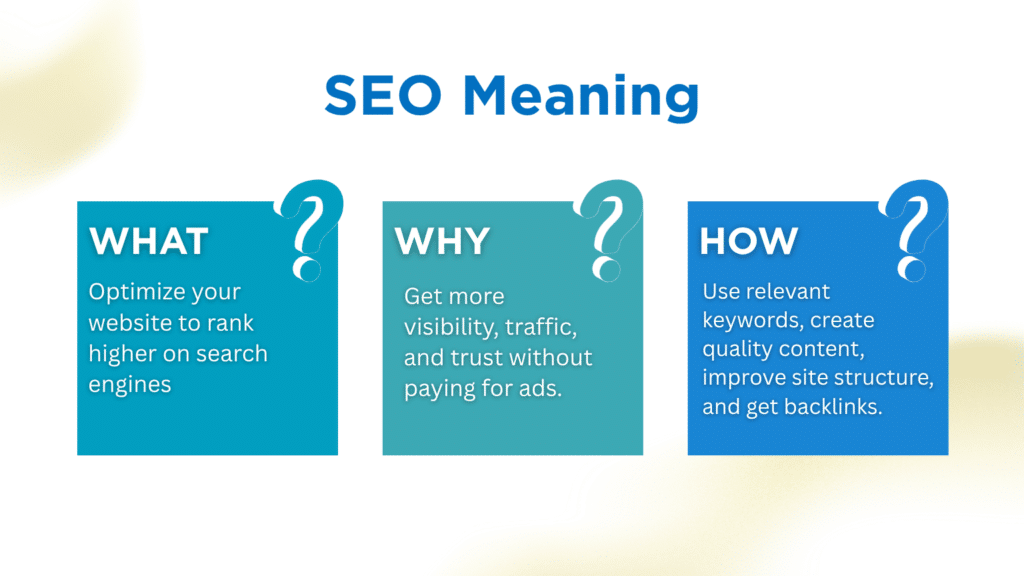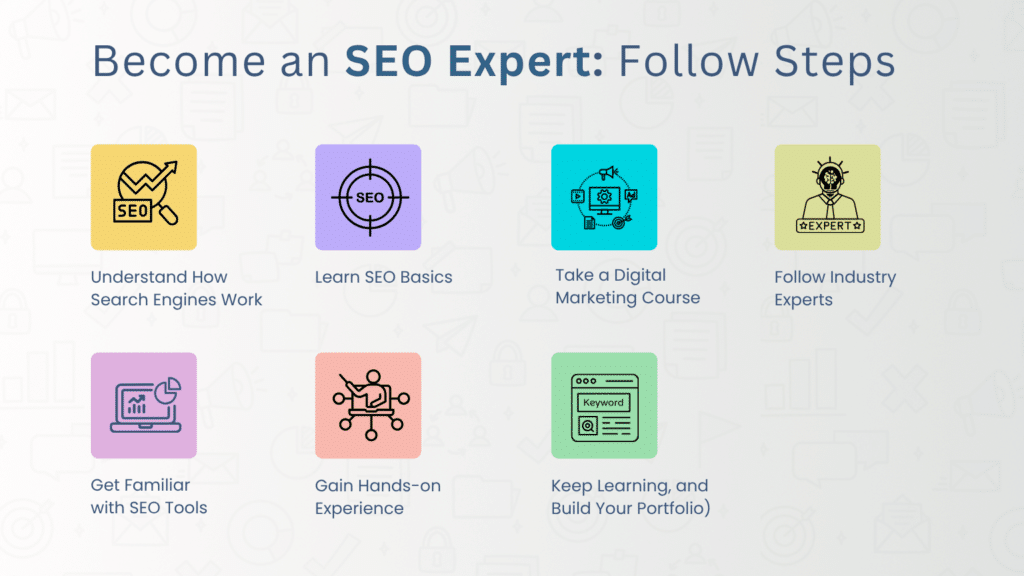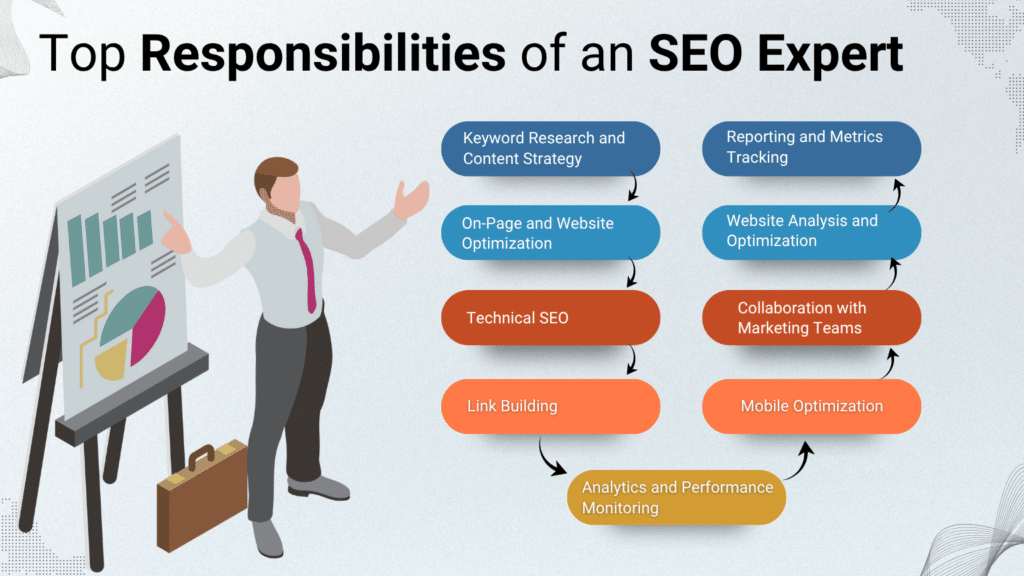Nearly 68% of online experiences begin with a search engine query. So, if your business is not visible on Google, you’re losing potential customers. Having a website or social media profile is not enough; you need to optimize your presence to rank higher and attract traffic.
That’s where an SEO expert plays a key role. They improve website visibility, boost rankings, and build brand trust through on-page and off-page strategies.
Becoming an SEO professional isn’t as hard as it seems. With the right knowledge, tools, and skills, anyone can master SEO and grow a successful career.
In this guide, you’ll learn how to become an SEO expert, the skills to focus on, and how to stay ahead in this fast-changing digital world.
Before you begin your journey, it is essential to understand what SEO actually means and how it works.

What is SEO?
You know, we all turn to a search engine whenever we need information, products, or services. So, it can be a huge source of free traffic if your website ranks within the top five positions. That is where Search Engine Optimization (SEO) comes in.
SEO is the process of improving a website’s visibility in search results. It helps your site appear higher on Google and other search engines, bringing in organic visitors without spending on ads.
Search engines like Google, Bing, and Yahoo use complex algorithms to rank websites. They look at factors such as user experience, content relevance, and website authority to decide which pages best answer a user’s query. SEO ensures your website meets these standards and performs better in search rankings.
If your website is not showing up on top, it could be due to reasons such as:
- Weak link-building strategy.
- Slow page loading speed.
- Poor user experience.
- Use of irrelevant keywords.
- Competitors have more optimized content.
To improve rankings, you must understand the basics of SEO and know how to optimize each part of your site. Once you master these essentials, you can steadily increase visibility, traffic, and leads from search engines.

What Is an SEO Expert?
An SEO expert is a digital marketing professional who helps websites appear higher in search engine results. Their main goal is to increase visibility, attract more visitors, and boost conversions using proven search engine optimization techniques.
An SEO expert knows how to analyze a website, identify gaps, and implement strategies that improve performance on Google and other search engines. In short, they understand how to make a website more discoverable and valuable to both users and search engines.
Here are some of the key tasks an SEO expert handles:
- Finding relevant keywords that attract organic traffic.
- Optimizing website content, titles, and meta tags.
- Improving site structure and user experience.
- Building high-quality backlinks from trusted websites.
- Monitoring website performance and analyzing SEO data.
Top SEO professionals constantly track metrics like rankings, traffic, and engagement to understand what works and what needs improvement. This data-driven approach helps maintain consistent growth in search performance.
Why Becoming an SEO Expert Matters
Every business today needs SEO to grow online. Whether it is a global brand or a small personal blog, visibility on search engines determines success. Without proper optimization, even the best websites struggle to reach their audience.
Becoming an SEO expert gives you a competitive edge in the digital world. It opens up countless career paths and gives you the freedom to choose how and where you want to work. Companies, agencies, and entrepreneurs all rely on skilled SEO professionals to help them rank higher, drive organic traffic, and build brand credibility.

Top Benefits of Becoming an SEO Expert
There are many reasons why choosing SEO as a career is both rewarding and future-proof. Let’s explore some of the top benefits.
1. Easy to Start
Starting your SEO journey is simple. You don’t need a specific degree or prior experience. With the right SEO course, practical training, and certification, you can gain the skills needed to enter the field quickly and confidently.
2. Huge Career Opportunities
The demand for SEO experts continues to grow. Every business wants to appear on the first page of Google, and they need professionals who can make it happen. This means more job openings, better salaries, and faster career growth.
3. Freedom to Work Your Way
Once you become an SEO professional, you can choose your own path. Work for a digital marketing agency, join a corporate team, or go freelance. You can even start your own business and use your SEO skills to grow it from scratch.
4. Flexibility and Work-Life Balance
SEO offers incredible flexibility. You can work remotely, collaborate with global clients, or manage your own schedule. It’s a great option for those who want to travel, enjoy personal freedom, or work from anywhere in the world.
5. Constant Learning and Growth
The SEO industry never stands still. With frequent algorithm updates and emerging trends, there’s always something new to learn. This constant evolution keeps the work exciting and ensures your skills remain in high demand.
6. Strong Job Security
SEO is not going away anytime soon. As long as people use search engines to find information, businesses will need SEO experts. This makes it one of the most stable and future-ready career choices in digital marketing.
Becoming an SEO expert is more than just learning how to optimize websites. It’s about helping businesses grow, staying ahead of the competition, and shaping your own successful career in the digital world.

How to Become an SEO Expert: Step-by-Step Guide
Want to become an SEO specialist in 2025? Follow these steps to master SEO and build a successful career.
Step 1: Understand How Search Engines Work
The first step to mastering SEO is to understand how search engines work. Many beginners jump straight into courses or advanced tutorials, but this can lead to confusion.
You need to know how search engines analyze websites to determine rankings in search results. Familiarize yourself with search engine algorithms and the key factors that influence rankings.
There are three main processes to focus on:
- Crawling – how search engines discover web pages and content on the internet
- Indexing – how they organize and store information from web pages
- Ranking – how they decide where a page appears in search results
Practical Example: Imagine you have a small blog about easy home recipes. If your blog posts do not have clear titles, headings, or descriptions, search engines may not understand what your pages are about. By adding a clear title, writing a simple description, and linking to other related posts, search engines can crawl, index, and rank your pages higher.
This helps more people find your blog when they search online.
Learning these basics is the first step in SEO and also helps you understand how digital marketing works. Proper SEO ensures your content reaches the right audience and drives more visitors to your website.
Learning these processes helps you optimize your website and content so search engines can easily find, read, and index your pages, improving your chances of ranking higher in search results.
Step 2: Learn SEO Basics
Once you understand how search engines work, the next step is to learn the basics of SEO. Many beginners think SEO is only about adding keywords or getting backlinks, but it is much more than that.
The real purpose of SEO is not just to attract visitors but to offer them a smooth and helpful experience when they land on your website.
You need to know the three main parts of SEO.
On-page SEO focuses on improving your website content, titles, and meta tags.
Off-page SEO helps build your website’s trust and authority through backlinks and mentions from other websites.
Technical SEO ensures that your website loads quickly, works well on mobile devices, and can be easily understood by search engines.
It is also important to learn how to do keyword research, write optimized content, analyze performance data, and follow Google’s SEO best practices.
Practical Example for Beginners:
Imagine you started a blog about digital marketing and wrote an article called How to Grow Your Business Online. If you do not use a focus keyword, meta title, or internal links, search engines may not understand what your post is about. But if you use a keyword like digital marketing tips for beginners, write a clear meta description, and link to another article like Best Free SEO Tools for 2025, your page has a better chance of ranking higher.
Learning these basics is the foundation of becoming an SEO professional. Once you feel confident with them, you can move on to advanced strategies and creative optimization techniques.

Step 3: Take a Digital Marketing Course
Now that you have started your SEO journey, it is time to level up. Learning SEO from scattered blogs or tutorials can be confusing, but today you have access to structured courses online, offline, and even on YouTube that guide you step by step.
Joining A good SEO course lets you learn from experts, complete hands-on projects, and get a real sense of how SEO works in the industry. You also get resources, exercises, and tips that fast-track your learning and build confidence.
Some options to consider:
- Content marketing courses show you how to create SEO-friendly content for blogs, websites, and social media.
- Complete SEO courses cover everything from beginner basics to advanced strategies, including case studies and practice exercises.
- Certification courses validate your skills and help you stand out when applying for jobs.
- Google certifications give recognized credentials and practical online training.
Practical Example for Beginners:
Imagine you want to start a blog about simple home workouts. By taking an SEO course, you learn how to research keywords like easy morning exercises or beginner yoga tips, write posts that people enjoy reading, and organize your content so search engines can find it. You also practice using tools to track traffic and see which posts perform best.
If you are looking for digital marketing courses in Kolkata, you can find programs that include SEO training along with broader digital marketing skills. These courses give you hands-on experience and prepare you to optimize websites, create content, and manage campaigns effectively.
Taking an online or offline course makes learning SEO exciting and practical. It gives you the skills, confidence, and guidance to move from a beginner to someone ready to handle real-world SEO projects.
Step 4: Follow Industry Experts
Once you understand the basics of SEO and have some hands-on experience, the next step is to learn from those who are already successful in the field. Following industry experts helps you stay updated with the latest trends, strategies, and algorithm changes.
Experts share tips, case studies, and practical insights that are often not found in courses or books. By observing their methods, you can learn what works in real-world SEO and avoid common mistakes.
Practical Example for Beginners:
Suppose you are managing a blog about healthy eating. By following SEO experts on social media or subscribing to their blogs, you might learn new strategies for optimizing recipe posts or increasing website traffic. For example, an expert may share how using structured data for recipes can make your posts appear as rich snippets in Google search results. Applying these tips can help your website gain more visibility and visitors.
Following industry leaders also gives you access to communities and forums where beginners can ask questions, share experiences, and get feedback. This network is invaluable for learning quickly and building confidence as an SEO professional.

Step 5: Get Familiar with SEO Tools
Learning SEO is not just about theory. To become effective, you need to know how to use the tools that professionals rely on. SEO tools help you research keywords, analyze competitors, track website performance, and optimize your content.
Some essential tools to start with include Google Analytics, Google Search Console, SEMrush, Ahrefs, and Ubersuggest. Each tool has its purpose, whether it is tracking traffic, identifying top-performing pages, or finding keyword opportunities.
Practical Example for Beginners:
Imagine you are managing a small blog about easy home workouts. By using a tool like Google Search Console, you can see which keywords people are using to find your posts. You might discover that “morning yoga routine” is driving a lot of traffic. With this insight, you can create more content around this topic and optimize existing posts to rank higher. Tools like SEMrush or Ahrefs can also show what your competitors are doing and help you improve your own website strategy.
Getting hands-on with SEO tools helps you make data-driven decisions, improve website performance, and gain confidence in your skills. This practical knowledge is essential for anyone aiming to become a professional SEO expert.

Step 6: Gain Hands-on Experience
Once you have learned the basics of SEO and practiced with tools, it is time to apply your knowledge in real-world projects. Many online SEO courses include live assignments that allow you to work on actual websites. These projects help you build an impressive portfolio even before starting your professional career.
You can also consider internships to see how marketing teams operate. Working under experienced SEO professionals teaches you more than books or tutorials ever can. You will learn how to create content, optimize on-page elements, execute SEO strategies, track results, analyze website traffic, and find relevant keywords.
Practical Example for Beginners:
Suppose a friend has a small bakery and wants more customers to find their website. You can help optimize their website by writing keyword-focused content like best cupcakes in [city], improving titles and meta descriptions, and checking site speed. By tracking the results, you can see how your changes impact traffic and engagement.
Try to work on different types of projects, even for family or friends, to gain varied experience. Identify your strengths and areas to improve. As you complete more projects, compile a portfolio with your work, client feedback, and success stories. This portfolio will become a key asset when applying for SEO roles or freelance opportunities.
Step 7: Keep Learning, and Build Your Portfolio
Learning SEO is just the beginning. To become an expert, you need to practice consistently, apply your knowledge across different projects, and keep learning. The more you work on SEO, the more confident and skilled you become.
Experiment with different strategies to see what works and what doesn’t. Keep a record of your SEO activities and results. Maintaining a log of your work helps track progress and analyze your growth over time.
SEO is constantly evolving. Google alone updates its algorithms hundreds of times a year. Staying informed by following trusted blogs and industry websites helps you adapt quickly and remain effective. The faster you adjust to changes, the better your campaigns perform.
Practical Example for Beginners:
Suppose you optimize a small local café’s website. Over time, some pages lose rankings due to a Google update. By checking SEO news sources and adjusting your keywords, content, and site structure, you can quickly regain visibility. Consistent practice and learning keep you ready for such changes.
At the same time, build a portfolio to showcase your work. A strong portfolio demonstrates your skills, results, and experience to potential employers or clients. Include projects from online courses, internships, or freelance work. Highlight measurable results such as keyword rankings, increased traffic, conversions, or revenue growth. Case studies of successful campaigns make your portfolio even stronger.
Tips for Beginners:
- Use numbers and KPIs to show your impact clearly.
- Add case studies explaining challenges, strategies, and results.
- Keep updating your portfolio with new projects, certifications, and achievements.
- Share insights and strategies to demonstrate your SEO knowledge.
Practical Example:
If you helped a café increase website traffic from 500 to 1,500 visitors a month, include this in your portfolio. Explain what you did, like optimizing keywords, improving page speed, and adding content. Numbers and real results make your portfolio convincing and help you stand out when applying for jobs or freelance opportunities.

Top Responsibilities of an SEO Expert
An SEO expert plays a dynamic role that combines strategy, analysis, technical know-how, and creativity. Here’s what a professional typically does:
1. Keyword Research and Content Strategy
Research and identify relevant, high-traffic, and competitive keywords. Use this information to plan content that aligns with user intent and business goals.
2. On-Page and Website Optimization
Optimize website content, headings, meta titles, descriptions, URLs, images, internal links, and conversion elements. Ensure every page is structured for both users and search engines to enhance usability and rankings.
3. Technical SEO
Perform website audits to fix issues affecting crawling, indexing, or site performance. Optimize site speed, mobile responsiveness, and internal linking. Basic coding knowledge helps implement fixes efficiently.
4. Link Building
Acquire high-quality, relevant backlinks to increase website authority and trustworthiness. Backlinks also drive referral traffic from other websites.
5. Analytics and Performance Monitoring
Track keyword rankings, organic traffic, conversions, bounce rates, and other KPIs using tools like Google Analytics and Search Console. Analyze data to make informed decisions and improve strategies.
6. Mobile Optimization
Ensure websites are mobile-friendly with fast loading speeds, responsive layouts, and smooth navigation. Mobile optimization is essential since Google prioritizes mobile-first indexing.
7. Collaboration with Marketing Teams
Work closely with content creators, social media managers, PPC teams, designers, and developers to align SEO strategies with broader marketing goals.
8. Content Development
Create or guide the development of high-quality, optimized content that addresses user queries and engages readers while following SEO best practices.
9. Staying Updated with Industry Trends
Follow SEO news, blogs, and forums to keep up with algorithm updates, ranking factors, and emerging strategies. Adapt campaigns quickly to remain effective.
10. Website Analysis and Optimization
Regularly evaluate website structure, content, meta tags, and user experience to identify areas for improvement. Make strategic updates to boost search engine visibility.
11. Web Coding Knowledge
Understand the basics of HTML, CSS, and JavaScript to implement SEO tactics, optimize code, and troubleshoot website issues in collaboration with developers.
12. Reporting and Metrics Tracking
Monitor key performance indicators like traffic growth, keyword rankings, and conversions. Use these insights to refine strategies and demonstrate the impact of SEO efforts.
Must-Have Skills & Qualities to Be an SEO Expert
To become a successful SEO expert, you need a combination of technical, analytical, and creative skills. Strong keyword research abilities help you find the right terms that drive traffic and conversions, while analytical skills allow you to track performance, interpret data, and make informed decisions. A basic understanding of technical SEO, including HTML, URLs, and site structure, ensures websites are easily crawlable and indexable. Effective decision-making keeps campaigns on track, and good communication skills help you clearly explain strategies and results to teams and clients. Creativity is essential for designing engaging content and campaigns that capture attention. Managing multiple tasks efficiently requires time management, and finally, adaptability is crucial as SEO constantly evolves with algorithm updates and industry trends. Together, these qualities build a well-rounded, capable SEO professional.
Different Career Options for SEO Professionals
SEO is one of the most in-demand skills in digital marketing, and mastering it opens up a wide range of exciting career opportunities. As an SEO expert, you can work directly on optimizing websites, improving content, and driving organic traffic.
If you enjoy creating content, you can become a content marketer, combining SEO strategies with blogs, social media posts, and website articles to reach the right audience.
For those who like advising and strategizing, working as an SEO consultant allows you to guide clients on improving rankings and boosting online visibility.
Leadership-oriented professionals can become SEO managers, leading teams, analyzing results, and ensuring campaigns deliver maximum impact.
And for those who love the bigger picture, a career as a digital marketer lets you coordinate multiple marketing channels, including SEO, content, PPC, social media, and email campaigns, to grow brands and businesses.
Explore Top 10 Highest Paying Digital Marketing Jobs in India
SEO Expert Salary in Kolkata
One of the most common questions aspiring professionals have after learning how to become an SEO specialist is — how much does an SEO expert earn in Kolkata? The salary of an SEO professional depends on experience, expertise, and skill level.
If you’re starting with an internship, you can expect a stipend of around ₹5,000 per month. Once you gain basic knowledge and start working as a beginner, the average salary ranges between ₹12,000 to ₹15,000 per month. With time, experience, and consistent learning, SEO professionals can earn 3-4LPA.
Joining a reputed digital marketing institute in Kolkata can help you master essential SEO skills, gain hands-on experience, and position yourself for higher-paying opportunities in the digital marketing field.
All right, but can you believe people are still asking, “Is SEO dead?”

Is SEO Dead? The Future of SEO
The truth is, SEO is very much alive and growing stronger every year.
Search engines keep evolving, and so do the ways people search online. What’s disappearing is the outdated version of SEO that depended on keyword stuffing, spammy backlinks, and shortcuts. Modern SEO focuses on understanding users, creating valuable content, and improving overall website experience.
Today, SEO is more than just ranking on Google. It helps businesses build trust, attract organic traffic, and convert visitors into loyal customers without heavy ad spending.
So, no, SEO isn’t dead. It has simply evolved into a smarter, more strategic, and creative field. If you keep learning, stay updated, and focus on delivering real value, SEO will continue to open new doors for success in the digital world.
Conclusion
No matter your background, whether you’re a designer, marketer, or business owner, anyone can become an SEO expert with the right guidance and practice.
SEO remains the backbone of digital marketing and offers endless career opportunities. The best way to begin is by joining a digital marketing institute that provides hands-on SEO training and real-world projects.
SEO isn’t dead. It’s evolving, and learning it today is an investment in a successful digital future.




This was well written and very useful. Appreciate the effort you put into it.
Great article—very well written and informative! I really liked how you explained the topic in such a clear and practical way. The points shared here are truly valuable for anyone looking to understand this subject better. Keep up the excellent work, looking forward to reading more from you!